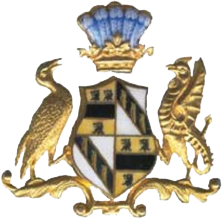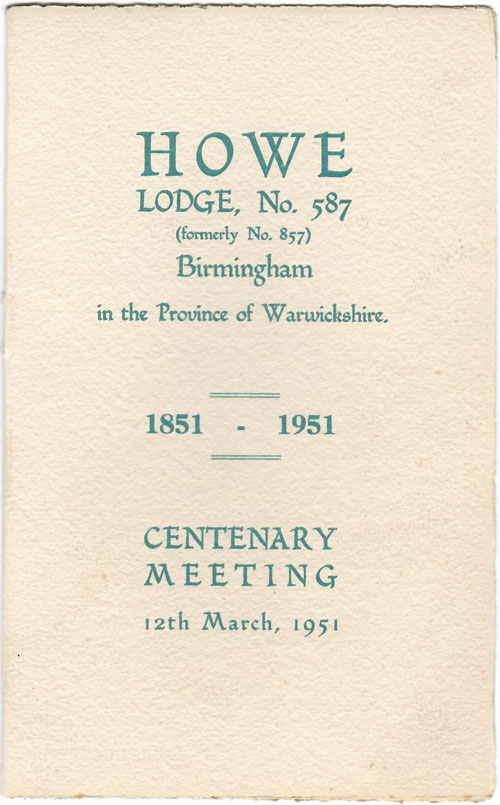In the year 1850 there were only four Masonic Lodges in the newly-created town of Birmingham, and they all met at the Town Hall Tavern, Ann Street (now known as Colmore Row). Some of the Brethren, all zealous members of the same Lodge of Instruction, resolved to found a new Lodge, which would shew Masonry pure and undefiled, free from the old tavern associations, and applying its money to purely Masonic purposes. These excellent principles naturally attracted some opposition and the founders sustained some set backs, but eventually, on 27th January, 1851, Grand Lodge issued to them a Warrant of Constitution under the name of the Howe Lodge, No. 857, taking its name from Lord Howe, the Provincial Grand Master of Warwickshire.
Suitable premises were found over the old Coal Wharf in Newhall Street, the site of which is now occupied by Richmond House, and on 10th March, 1851, the new Lodge held its first Regular Meeting in ” The Masonic Rooms, Newhall Street.” W. Bro. T. C. Roden, a Past Master of St. Paul’s Lodge, No. 51, acted as Installing Master, and installed 13ro. John Ward Lloyd as the first Worshipful Master of the Lodge, but there was no ceremony of consecration as would be the case at the present day.
During the ensuing four years the Lodge grew and prospered, devoting the whole of its income to purely Masonic purposes, until it was at length in a sufficiently strong financial position to carry out its original intention of erecting a Masonic Hall. In November 1855 a house, No. 27 (now No. 75) Newhall Street, nearly opposite the existing Masonic Rooms, was acquired on lease, and a sum of £825 was spent on erecting a Lodge Room and in carrying out alterations and improvements. On 8th December, 1856, the Lodge held its first meeting in the new Rooms, and the Building Committee ” congratulated the Brethren upon being in possession of the most commodious premises for Masonic purposes in the Province of Warwickshire.” Much of the Lodge furniture and equipment was presented by the Brethren, and their generosity and enthusiasm was so great that within a year the new building was entirely free of debt. The new Rooms provided a home not only for the Howe Lodge itself, but also for its various associated Masonic bodies, the Howe Lodge of Instruction, the Howe Mark Lodge, and the Howe Royal Arch Chapter, all of which were under the direct control and management of the Lodge. Not only were the accounts kept by the Lodge Treasurer, who received and paid all income and expenditure, but all candidates for membership of the Lodge of Instruction, the Mark Lodge and the Royal Arch Chapter were balloted for in the Craft Lodge, to whom their fees were paid.
The Lodge then offered the use of the premises to other Lodges at very low rentals, and within a few years the majority of the Birmingham Lodges were holding their meetings there. In 1863, on the revision of the Register of Grand Lodge, the number of the Howe Lodge was altered from 857 to 587. By that time there were fourteen Masonic bodies meeting in the Howe Masonic Rooms, and it became clear that if the organisation was to continue to expand larger premises must be found. The Howe Lodge again took the lead in the matter, and a Limited Liability Company was formed, charged with the responsibility for erecting a Masonic Hall. A suitable site was acquired at the corner of New Street and Ethel Street, and on 20th September, 1865, the foundation stone of a Masonic Hall was laid with appropriate ceremonial. When the new building was completed the Howe Lodge, in consideration of what it had done for the promotion of Free-masonry in Birmingham, was granted the privilege of holding the first meeting there on 11th October, 1869. The Lodge granted to the Masonic Hall Company the right to use all its furniture and effects presented by the Brethren and at the same time sold all the remaining furniture, organ and equipment to the Company at valuation so that the links with the past might, as far as possible, be preserved. From that time forward the history of the Lodge has been quiet and uneventful. The aims of the founders have been accomplished and their idea of meeting in premises set apart for Masonic purposes, so novel in Birmingham in 1850, has now become the general policy not only in Warwickshire but generally throughout the country. In the past hundred years the Lodge has numbered among its Members leaders in the arts, the professions, in business and in municipal affairs. Its Members have made a worthy contribution to their day and generation in their respective spheres. It will be for those who follow in the years to come to preserve the great principles which the Founders had in mind in establishing the Lodge, and which have during the past hundred years become a tradition.

